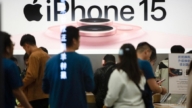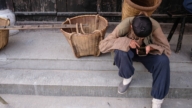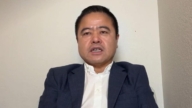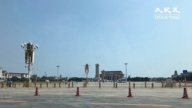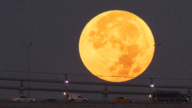【新唐人2012年10月9日訊】2012年中國的「黃金周」共8天,號稱「史上最長」,不過對很多人來説,「最長」的不僅是假期,還有堵車的時間,排隊的長度,清掃遊客垃圾和雜物的時間……「黃金周」亂成一鍋「黃金粥」,評論指出,官方試圖拉動內需的措施,卻破壞了旅遊本身的樂趣。
「黃金周」在10月7號結束了,回顧黃金週期間,中國16個省市24條高速公路出現嚴重擁堵,共發生交通事故6萬8千多起,各大旅遊景點爆棚,到處人滿爲患,連敦煌的駱駝也纍的「過勞死」。
獨立中國問題專家,財經、社會類評論家鞏勝利指出,之所以出現這樣的現象,是因爲長假人爲的將所有的人力資源都集中到一起,違反了自然規律。
獨立中國問題專家鞏勝利:「比如説中國的華山,華山自古一條道,那一條道怎麼能經得起千千萬萬個人都上去踩踏?這可以講,是一種違反自然規則的事情。按照中國官方的說法,可以刺激人們的消費。」
爲了刺激節假日旅遊消費,中共宣佈「重大節假日期間7座及以下小型客車高速公路免費通行」,這次「黃金周」首次實施,於是在頭一天,9月30號0點,高速公路免費時段開始,多條主要高速公路就出現擁堵狀況。
北京天則經濟研究所副所長馮興元指出,經濟學上早就可以預測到,高速公路取消通行費,將會導致擁堵。
北京天則經濟研究所副所長馮興元:「高速收費取消,肯定會出現(擁堵),經濟學早就預測到的這種結果。價格越低,需求量越大,當價格為零的話,那它的需求量應該是最大的。那麽也説明瞭,你要讓道路更加通暢的話,跟平時比較,恰恰不能降低費用,越降低費率就越擠。」
隨著經濟增長放緩,關於中國經濟是否會「硬著陸」的擔憂增多,因此「黃金周」究竟能在多大程度上拉動中國的內需備受關注。中國旅遊研究院節前預測,黃金週期間,旅遊接待人次約為3.62億,旅遊收入約為1800億元人民幣,比上年同期增長24%。
但事實上,遊客在「黃金周」期間付出了很多不合理的費用。例如有遊客在連雲港,吃到一碗165元人民幣的天價海鮮炒麵,武漢小吃街一碗白粥索價50元。被堵在華山上的內蒙古遊客董先生,因爲要求退擺渡車的票錢被痛毆,和妻子兩人被捅了十幾刀。
鞏勝利:「由於中國這個內需長期拉不動,有些人就提出這個點子,但是這個點子對老百姓來說,完全可以這麼講:是一種勞民傷財的事情。完全是為了利益而來的,沒有任何休閒,舒適。奔命的形式在中國的長假裡,我一直提出這種觀點,沒有任何好處。」
律師羅文方也指出,這樣推動的「假日經濟」是一種浪費。
律師羅文方「他就是刺激人消費,很明顯,刺激有工作和收入這部分人的消費,增加旅遊景點收入,間接解決就業問題, 但是這樣一年就這幾個週,把這些人臨時召集起來,黃金周以後,那些人又閒置了啊,這是一種浪費。」
今年「黃金周」的亂象引發眾多反思,有國內媒體評論說,只有推行「帶薪年休假制度」才是終極解決之道。但早在1995年,推行「帶薪休假」制度就寫進了勞動法,2008年,國務院發佈條例,規定了職工有「帶薪休假」的權利,但空有口號,沒有實際上的條例支撐它,到現在還只是一紙空文。
採訪/田淨 編輯/尚燕 製作/柏妮
China’s Golden Week Holiday Chaos Far Cry from ‘Relaxing’
China’s 2012 “Golden Week" was an 8-day holiday period,
said to have been the longest holiday in recent history.
But for many, “the longest" does not only refer to days off,
but also to the traffic jams, queue lengths, and the time taken
to clean the garbage and mess left over by the tourists.
Some say the method the officials used to try to stimulate
domestic demand destroyed the fun of traveling, saying:
“Golden Week chaos into a pot of gold porridge!”
Asia’s 8-day “Golden Week" holiday ended on October 7th—
yet it wasn’t much of a relaxing break for many.
24 highways in 16 Chinese provinces saw serious congestions;
680,000 traffic accidents occurred;
major tourist sites were overcrowded; and
one camel in Dunhuang City even died from overwork.
Gong Shengli, independent china expert, and financial
and social critic, says this phenomenon happened because
China’s human resources are concentrated artificially—
it’s violating the laws of nature.
[Gong Shengli, Independent China Problem Expert]:
“Take the Huashan Mountain in China, for example,
from ancient times until now, there’s only been one path; how
can it stand hundreds of thousands of people walking on it?
You could say it violates the laws of nature,
but officials say it can stimulate people’s consumption."
To stimulate travel, the Chinese Communist Party (CCP)
made the 7-seat minibuses ‘free of charge’ on highways during the major holidays, starting with the Golden Week.
So on September 30th—the first day of free highway travel—
numerous major highways experienced major congestion.
Feng Xingyuan, deputy director of Beijing TianZe Institute
of Economics, says it is predictable that canceling toll fees on highways will lead to congestion.
[Feng Xingyuan, Beijing TianZe Institute of Economics]:
“Canceling highway tolls causes congestion;
economists predicted this result long ago—the lower the price,
the greater the demand; when it’s free, the demand will be the biggest.
It shows that if you want to make traffic flow more smoothly
than usual, you can’t cut the costs; the cheaper the busier."
With China’s economic slowdown, there are rising concerns
over whether the Chinese economy will take a “hard landing".
It’s led to further concerns over how much the Golden Week
will stimulate domestic demand in China.
Before Golden Week the China Tourism Research Institute
forecasted that the holidays will see about 362-million tourists
and tourism revenue would reach about 180-billion yuan;
an increase of 24% from 2011.
In fact, visitors ended up paying astronomical rates
during Golden Week—in Lianyungang City,
fried seafood noodles sold at
165 yuan (around U.S. $26) per bowl;
and in Wuhan Snack St., a bowl of porridge was
50 yuan (around U.S. $8).
Mr. Dong and his wife, who were Inner Mongolian tourists,
were caught in gang fights and stabbed with a knife 9 times
when trying to get a refund for their car ferry ticket after
being stuck in Huashan Mountain.
[Gong Shengli]: “Because of China’s domestic demand
not being sustained long-term, some proposed the idea of raising consumption,
but it’s encouraging wasting money; it’s entirely for profit.
I’ve been advocating this view—there’s no comfort or
leisure left in the Chinese holidays;
just keeping on the run—there are no benefits."
Lawyer, luo Wenfang, says this “holiday economy" is a waste.
[Luo Wenfang, Lawyer]: “It’s clearly to stimulate consumption;
stimulating those who have jobs and income to consume,
increasing the income of tourist sites indirectly,
and solving the employment problem.
But it’s only several weeks annually, and after Golden Week
those who make money off tourists are idle—this is a waste."
This year’s Golden Week chaos has made people reflect on
the holiday period.
Domestic media reported that paid annual-leave would be
the ultimate solution;
yet China’s labor law had already applied ‘holiday pay’
in 1995 and the State Council had issued workers with the right to‘paid leave’ in 2008.
Reality shows that the laws and regulations on workers’ rights
are merely empty slogans, with nothing actually materializing.


